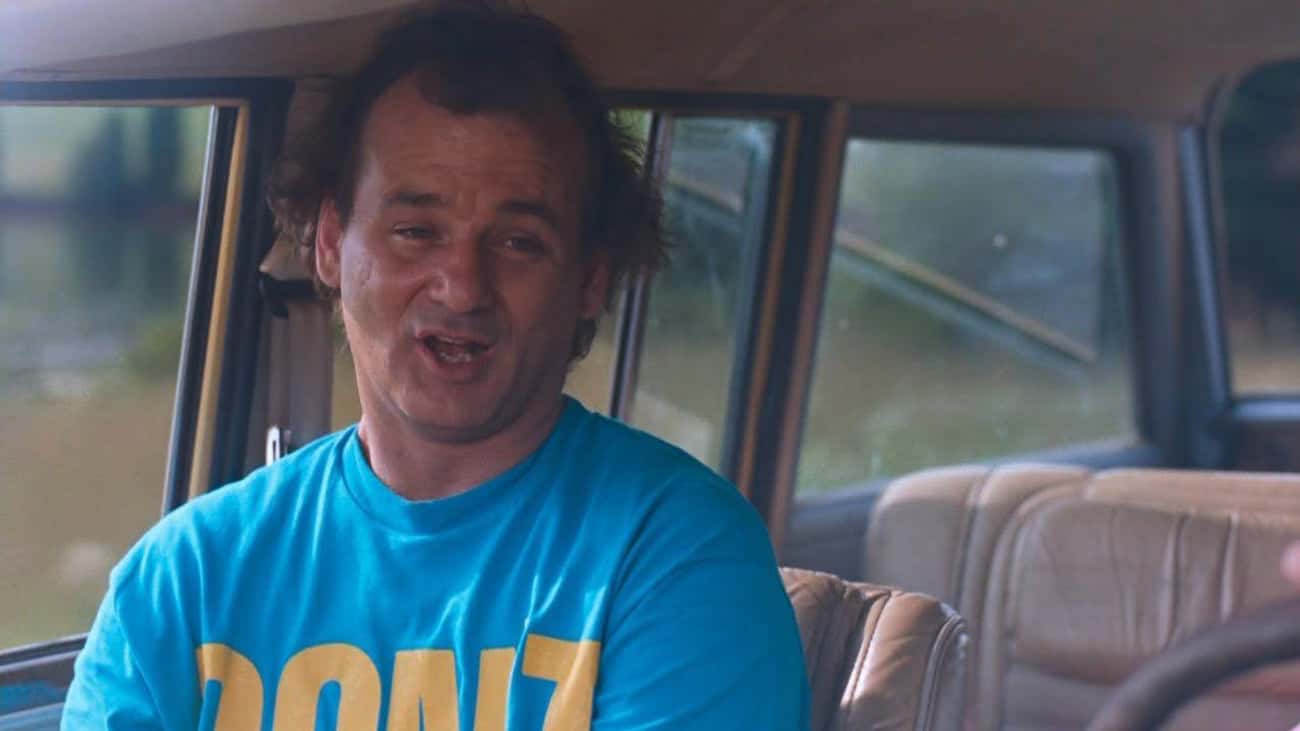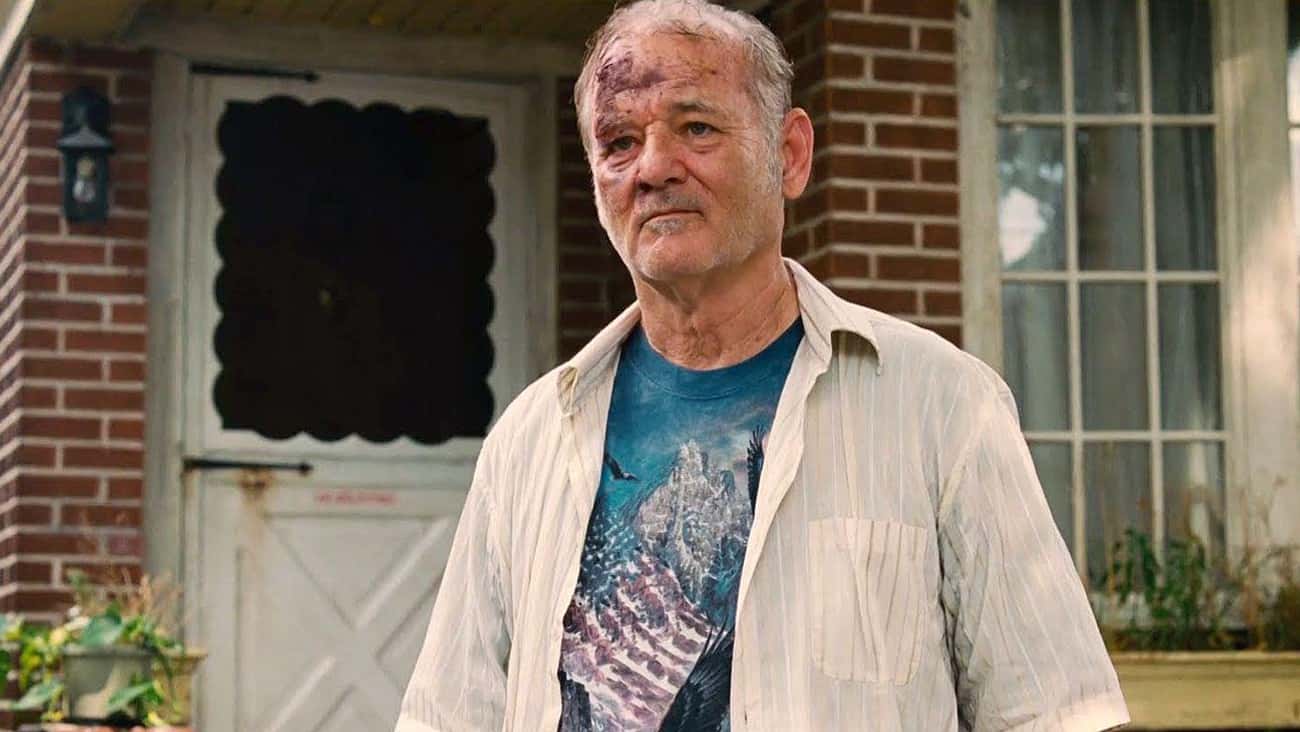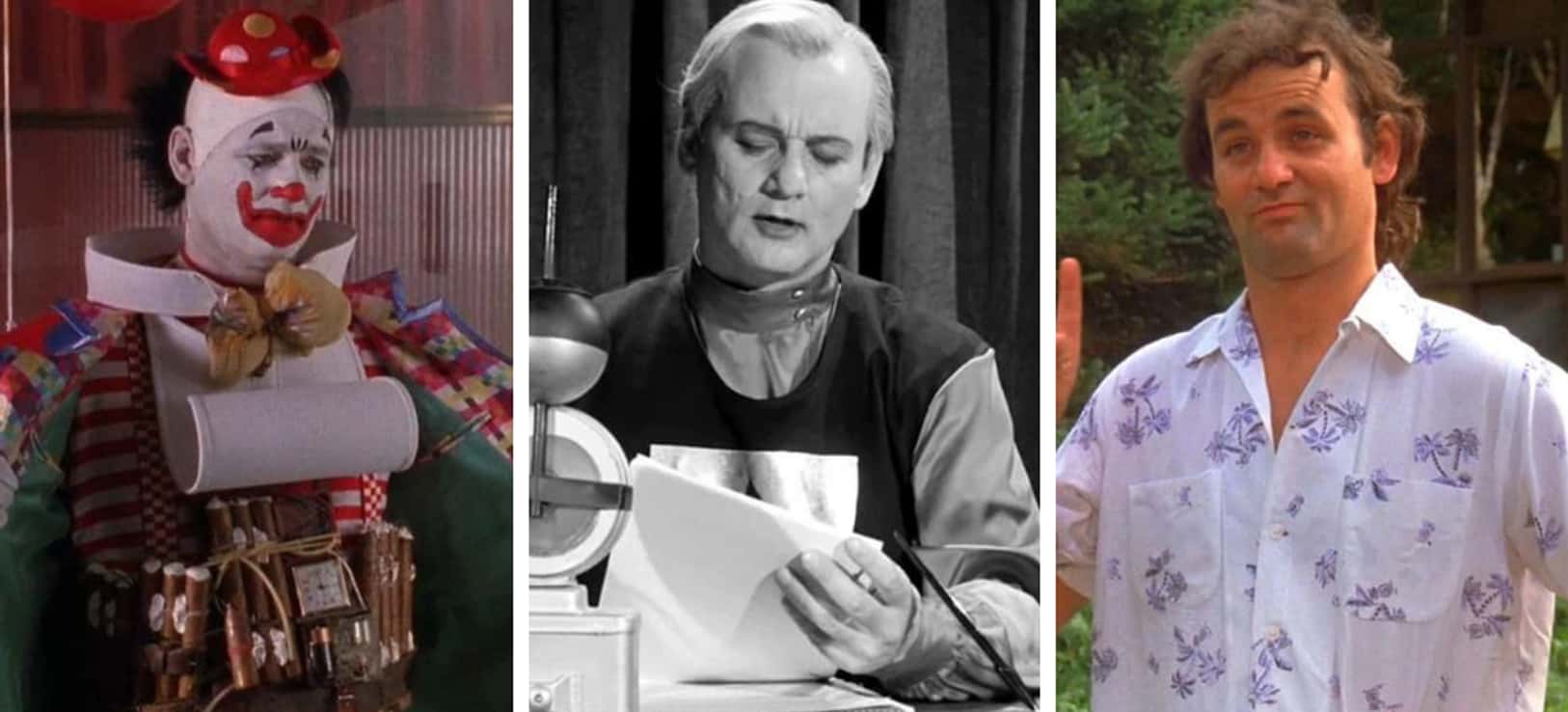With a filmography as stacked as Bill Murray’s, there are plenty of his movies that get the deserved praise and recognition across the board. Groundhog Day (1993), Ghostbusters (1984), and Caddyshack (1980), for example, are blockbusters that are worthy of their universal praise. But what about Bill’s other performances that tend to get eclipsed? We are diving into the Murray performances that fly under-the-radar despite being some of his best work.
1. What About Bob? (1991)

Photo: Buena Vista Pictures Distribution
What About Bob? was a fairly big hit in the summer of 1991, but it hasn’t quite been discovered by viewers who weren’t around to see it at the time. Bill Murray plays Bob Wiley, a deeply neurotic man so incapable of handling his own problems that he crashes his therapist’s vacation. Richard Dreyfuss plays that therapist, Dr. Leo Marvin, and his comic exasperation plays nicely off Murray’s clinginess.
The interactions between the men provide many big laughs. What About Bob? represents Murray at his most impish. He apparently took a method approach to the role, incessantly angering Dreyfuss off-camera, as well as on. His co-star may not have liked that idea, but there’s no doubt that the behind-the-scenes tension created a hilariously real dynamic between the characters they play. Watching Bob get on Dr. Marvin’s nerves is uproarious.
2. Meatballs (1979)

Photo: Paramount Pictures
Meatballs broke Bill Murray into the movies when it hit cinemas in 1979. Although comedy fans of a certain age are old enough to remember and revere it, younger audiences don’t seem to have caught on. The actor plays Tripper, the head counselor at a summer camp. He takes a lonely, awkward teenage boy named Rudy (Chris Makepeace) under his wing – in between prank wars and general mayhem, that is.
Directed by Ghostbusters‘ Ivan Reitman, Meatballs perfectly captures the energy Murray had at that stage in his career, when he was hot off Saturday Night Live. The movie’s best scene finds Tripper giving a motivational speech to his campers, who have become discouraged after faring poorly in a series of Olympic games against a rival camp. Murray improvised the entire thing, including the now-famous mantra “It just doesn’t matter!” firing up his young co-stars just as his character fires up his charges. Meatballs demonstrates that a director can simply encourage Murray to ad-lib, and the results will be incredible.
3. St. Vincent (2014)

Photo: The Weinstein Company
In St. Vincent, Bill Murray plays Vincent MacKenna, a drunken, bitter war veteran who spends his days either at the bar or the race track. He gets an unlikely gig as a babysitter when his new neighbor (Melissa McCarthy) needs someone to be with her 12-year-old son after school. This turns out to be a mixed bag. On one hand, Vincent takes the boy to places where kids should not be. On the other, he teaches him to have self-confidence and to not take flak from the bullies at school.
At its core, St. Vincent is about how someone can be deeply flawed and still be a good person. Who better Bill Murray to get this idea across? Regardless of whether Vincent is having a cantankerous moment or a generous one, Murray continually shows us the character’s humanity. This is one of his juiciest roles, and also one that allows him to bring all his specialties to the table at the same time. He makes Vincent hilarious yet troubled, and sarcastic but sweet. It’s a multi-dimensional performance in a genuine feel-good film.
4. Kingpin (1996)

Photo: Metro-Goldwyn-Mayer
Bill Murray only appears at the beginning and end of Kingpin, yet his presence is enormous. He’s Ernie McCracken, a professional bowler who has a rivalry with fellow bowler Roy Munson (Woody Harrelson). They get involved in a hustle gone wrong in the opening scenes – an event that causes Roy to lose a hand while Ernie gets away scot-free. During the big climax, the two are reunited at a championship match.
Kingpin was directed by Peter and Bobby Farrelly, directors who were known for making wild, outlandish comedies in the ’90s, including There’s Something About Mary. Because their movies were larger than life, Murray knew enough to let go of the reins. Sporting the world’s worst, most out-of-control comb-over, he enters the third act of this picture and blows the roof off with his side-splitting depiction of Ernie’s super-competitive nature. He’s a madman in this picture, and his energy is glorious.
5. Quick Change (1990)

Photo: Warner Bros. Pictures
Quick Change is one of those movies where people who have seen it perpetually ask themselves, “Why isn’t this considered a classic?” Bill Murray not only stars in this 1990 comedy, but also co-directed it. He plays Grimm, the mastermind of a bank robbery. When he and his two cohorts, played by Geena Davis and Randy Quaid, try to make an escape from New York City, one hitch after another conspires to make that impossible.
You won’t get a better opportunity to see Murray doing slow-burn comedy than this. Although he gets to drop some of his patented sarcastic one-liners, he’s essentially the straight man here, forced to react to all the crazy people doing equally crazy things around him. It’s different from his normal style, where he’s the overtly funny one, but he does it extremely well. His work, combined with the chemistry he generates with his co-stars, makes Quick Change a movie every comedy fan should see.
6. Wild Things (1998)

Photo: Sony Pictures Releasing
When it came out in 1998, Wild Things was mostly notable for some steamy scenes between Denise Richards and Neve Campbell, as well as Kevin Bacon appearing fully nude. That was a novelty back then, especially since Campbell was shedding the good-girl image she cultivated on TV’s Party of Five. For that reason, it was easy to overlook Bill Murray’s delightfully twisted turn as Ken Bowden, a sleazy personal injury lawyer, just before his acclaimed performance in 1999’s indie darling Rushmore.
The whole tone of Wild Things is campy and over the top. The actor slides into that nicely, making Ken an amoral guy who has no hesitation about trying to manipulate the court in every way possible. That includes showing up for a trial wearing a neck brace. Murray’s performance contributes its own layer of craziness to a movie that’s already bursting at the seams with crazy. It also provides a temporary respite from the sexually charged antics that fuel the plot, giving the audience time to breathe in between sessions of panting.
7. Where The Buffalo Roam (1980)

Photo: Universal Pictures
Eighteen years before Johnny Depp played noted gonzo journalist Hunter S. Thompson in Fear and Loathing in Las Vegas, Bill Murray did it in Where the Buffalo Roam. The movie looks at the twisted friendship between Thompson and his friend/lawyer Carl Lazlo, played by Peter Boyle. Of course, substances are ingested in significant quantities.
To be honest, Where the Buffalo Roam isn’t a particularly good movie. It has a 16% approval rating at Rotten Tomatoes for a reason. That said, Murray is fantastic as Thompson, perfectly nailing his barking voice and chaotic personality. The men spent time together, during which Thompson tied Murray to a chair and threw him into a swimming pool, nearly drowning the star. Being part of such antics and observing the patented HST madness firsthand absolutely fuels Murray’s work here. It’s worth noting that his interpretation of Thompson is more realistic than Depp’s cartoonish one.
8. The Life Aquatic With Steve Zissou (2004)

Photo: Buena Vista Pictures
In Wes Anderson’s The Life Aquatic with Steve Zissou, Bill Murray plays a Jacques Cousteau-type underwater explorer/documentarian going through personal and professional crises. Chief among them is that his longtime colleague was eaten by a “jaguar shark.” He, therefore, makes it his goal to take his crew out into the water in order to exact revenge against the beast.
You wouldn’t think Murray’s anarchic comedy style would mesh with Anderson’s fussy, meticulously orchestrated storytelling style, but it does. As Zissou, he smartly underplays, giving the suggestion that the character’s problems have arisen because he’s gone comatose to the world. It’s a smart choice in capturing this man’s dilemma, yet it also makes all the eccentric things happening around him seem funnier. The Life Aquatic wasn’t Anderson’s biggest hit, although it’s absolutely his most underrated film, thanks in part to its star’s effectively low-key work.
9. Ed Wood (1994)

Photo: Buena Vista Pictures
Ed Wood casts Johnny Depp as the titular filmmaker, a guy with tons of enthusiasm and very little talent. It details the making of Wood’s 1957 debacle Plan 9 from Outer Space, which is widely (and rightly) considered one of the most hilariously awful movies ever made. Bill Murray plays “Bunny” Breckenridge, a drag queen and symnpathetic soul who assists Ed with the financing and production of his movies.
Bunny was basically a caricature to begin with – and Murray effectively brings some real pathos and humanity to a role many actors would have played as a cliche. The actor calls upon his extensive show-biz experience to create a character who balances an earnest heart and desire to entertain with a bit of hard-earned cynicism.
10. Broken Flowers (2005)

Photo: Focus Features
In Jim Jarmusch’s witty and touching Broken Flowers, Bill Murray takes on the role of Don Johnston, a guy whose romantic life has consisted of a string of short-term relationships. After he gets an anonymous letter informing him that he has a grown son he never knew about, Don goes on a tour, visiting his former lovers in an effort to figure out who had his child.
As is befitting a Jarmusch film, Murray gives a minimalist performance. Don doesn’t readily show his emotions, so the actor has to seize our attention and earn our sympathy with just a simple bit of body language or a glance. We’re used to seeing him go “big,” so seeing him go “small” proves to be a revelation. The expression on his face in the movie’s last shot – which is filled with sadness and regret – will haunt you afterward.
11. Get Low (2009)

Photo: Sony Pictures Classics
In Get Low, Robert Duvall is Felix Bush, a hermit who arrives in a small town with a sizable wad of cash. He intends to throw a funeral party for himself so that he can enjoy the celebration of his life while he’s still around to experience it. Bill Murray is Frank Quinn, a sleazy mortician who knows about Felix’s money and hatches a scheme to earn his business.
Roger Ebert best summed up the appeal of Murray’s performance, citing how he turns Frank into someone who “would take the bills out of your billfold before screwing you in, explaining he doesn’t want you to spend eternity with a bump under your butt.” He brings just the right amount of twistedness to the character, hilariously conveying his obsession with getting people to give him their money. And he does this without going over the top. Scenes between him and Duvall, playing Felix as the kind of guy who sees right through such shenanigans, light up the whole film.
12. Coffee And Cigarettes (2003)

Photo: MGM Distribution Co.
Coffee and Cigarettes is a 2003 anthology film from Jim Jarmusch, with whom Murray has worked multiple times. The whole movie is a kick, but the best section by far is the one entitled “Delirium.” In it, Wu-Tang Clan members GZA and RZA sit in a diner. They strike up a conversation with their waiter, who inexplicably happens to be Bill Murray. Much of their conversation refers to how bizarre this scenario is. And, in fact, they humorously refer to him as “Bill Murray,” even when addressing him directly, as though it would be disrespectful to simply call him “Bill.”
If you want to see Bill Murray cut completely loose, this is as good an opportunity as you’ll get. Swigging coffee right out of the pot, he’s here to play and have fun. Jarmusch lets him off the hook to riff and generally goof around with two guys you’d never expect to see him acting with. The result is magical, creating an oddball chemistry that’s fueled by Murray’s unpredictable nature. He knows the Wu-Tang collaboration is unexpected, so he has a field day with it.
13. Mad Dog And Glory (1993)

Photo: Universal Pictures
Bill Murray joined forces with Robert De Niro for the 1993 dark comedy Mad Dog and Glory. It’s about a timid police crime scene photographer who saves the life of a mobster and is “rewarded” with the company of an attractive young waitress (Uma Thurman). She’s in debt to the mobster and goes along with the scheme to pay it off.
If you assumed De Niro plays the mobster, you’re 100% wrong. In a fun bit of casting against type, Murray is the heavy here. He’s really good at it, too, bringing a sense of quiet menace to the role. Mad Dog and Glory is one of the few times where you get to see him play a bad guy. Murray is visibly relishing the chance to show a dark side by unleashing the anger that’s always been an undercurrent in his personality. Beyond that, the movie has some genuine laughs, plus a compelling story that was written by acclaimed novelist Richard Price.
14. The Razor’s Edge (1984)

Photo: Columbia Pictures
In 1984, the same year Ghostbusters was released, Bill Murray made his first stab at showing dramatic range. The Razor’s Edge is based on W. Somerset Maugham’s novel about a WWI veteran who treks to the Himalayas in search of inner peace and enlightenment. Murray even co-wrote the screenplay. In a famous bit of Hollywood lore, he only signed on to make Ghostbusters if Columbia Pictures would also bankroll this passion project.
Unfortunately, it came out second, leading to audience rejection. Nobody had any interest in seeing the star of the biggest comedy hit of all time getting serious. That’s too bad, because even though the movie itself has some flaws, Murray works hard to show another side of his talents. His performance in The Razor’s Edge is quiet, emotional, and intellectual. His sensitive work proved a harbinger of where his career would go two decades later.
15. On The Rocks (2020)

Photo: A24
On the Rocks stars Rashida Jones as Laura, a young mother who thinks her husband might be cheating on her. Unsure of what to do about the situation, she seeks guidance from Felix (Bill Murray), a playboy type who knows all about chasing the ladies. He also happens to be Laura’s father.
Murray’s performance works on two levels. On one, he plays a lothario with equal parts credibility and wit. Felix loves to drink and flirt with any woman who wanders through his sight line. On the other, the actor helps us understand that Felix thinks he can atone for having been an inattentive father by helping Laura solve her problem. He’s filled with guilt. On the Rocks marks one of Murray’s most complex performances, one that’s somehow funny and mournful at the same time.
16. Cradle Will Rock (1999)

Photo: Buena Vista Pictures
Based on true events, Cradle Will Rock tells the story of a group of prodigiously talented artists who attempt to put on a left-leaning, politically charged stage show, only to be met with resistance. John Cusack plays Nelson Rockefeller and Angus Macfadyen is Orson Welles. Tim Robbins, no stranger to political art, wrote and directed.
Also in the ensemble cast are Susan Sarandon, Hank Azaria, Jack Black, Paul Giamatti, Vanessa Redgrave, and, of course, Murray. He plays Tommy Crickshaw, a conflicted, red-hating ventriloquist who ends up testifying before a congressional committee looking into alleged communist activity within the artistic community. The role is an interesting one in that it somewhat takes the actor back to his roots. Saturday Night Live and National Lampoon were both counter-cultural phenomenons. His later work wasn’t nearly as political. Cradle Will Rock finds him tapping into that side of his comedy again, believably creating a character who wears his views on his sleeve.
17. Hamlet (2000)

Photo: Buena Vista Pictures
Bill Murray doing Shakespeare? It’s not as crazy as it sounds. Then again, the screen version of Hamlet in which he appears isn’t a typical take on that material, either. Michael Almereyda’s 2000 adaptation is set in the modern world and casts Ethan Hawke as an aspiring filmmaker who’s haunted by his late father while simultaneously taking on the head of the so-called Denmark Corporation. Murray plays Polonius, the duplicitous guy who has his own daughter get close to Hamlet and make an audio recording of their conversations.
The actor’s performance was described by Entertainment Weekly‘s Lisa Schwarzbaum as “gleefully sharky and outrageously insincere.” Murray may not be the first actor who comes to mind when discussing Shakespeare, but he has always specialized in characters who have a bit of an edge to them. As Polonius, he amplifies that quality, creating a credible foil for Hamlet in the process. The Shakespearean context allows viewers to see that side of his skill set from a different angle.

